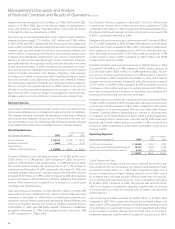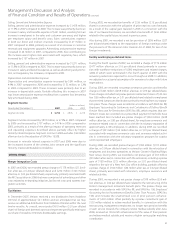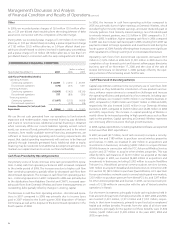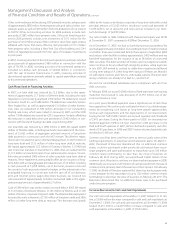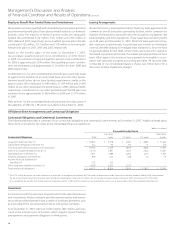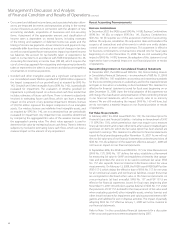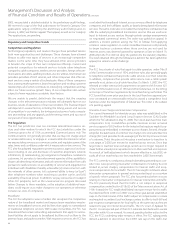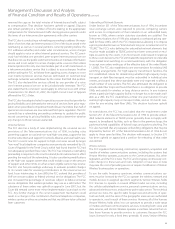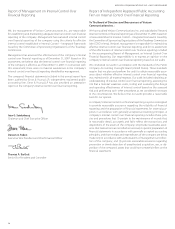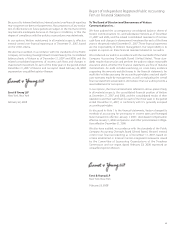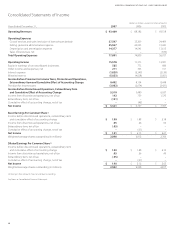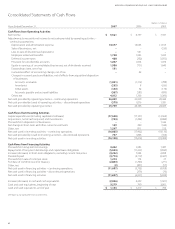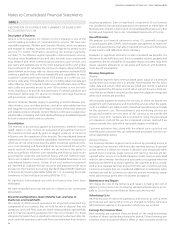Verizon Wireless 2007 Annual Report Download - page 37
Download and view the complete annual report
Please find page 37 of the 2007 Verizon Wireless annual report below. You can navigate through the pages in the report by either clicking on the pages listed below, or by using the keyword search tool below to find specific information within the annual report.Unbundling of Network Elements
Under Section 251 of the Telecommunications Act of 1996, incumbent
local exchange carriers were required to provide competing carriers
with access to components of their network on an unbundled basis,
known as UNEs, where certain statutory standards are satisfied. The
Telecommunications Act of 1996 also adopted a cost-based pricing stan-
dard for these UNEs, which the FCC interpreted as allowing it to impose
apricingstandardknownas“totalelementlongrunincrementalcost”or
“TELRIC.”TheFCC’srulesdefiningtheunbundlednetworkelementsthat
mustbemadeavailableatTELRICpriceshavebeenoverturnedonmul-
tiple occasions by the courts. In its most recent order issued in response
to these court decisions, the FCC eliminated the requirement to unbundle
mass market local switching on a nationwide basis, with the obligation
to accept new orders ending as of the effective date of the order (March
11, 2005). The FCC also established a one year transition for existing UNE
switching arrangements. For high-capacity transmission facilities, the
FCC established criteria for determining whether high-capacity loops,
transport or dark fiber transport must be unbundled in individual wire
centers, and stated that these standards were only expected to affect a
small number of wire centers. The FCC also eliminated the obligation to
provide dark fiber loops and found that there is no obligation to provide
UNEs exclusively for wireless or long distance service. In any instance
where a particular high-capacity facility no longer has to be made avail-
able as a UNE, the FCC established a similar one year transition for any
existing high-capacity loop or transport UNEs, and an 18 month tran-
sition for any existing dark fiber UNEs. This decision has been upheld
on appeal.
As noted above, the FCC has concluded that the requirement under
Section 251 of the Telecommunications Act of 1996 to provide unbun-
dlednetworkelementsatTELRICpricesgenerallydoesnotapplywith
respect to broadband facilities, such as fiber to the premises loops, the
packet-switched capabilities of hybrid loops and packet switching. The
FCC also has held that any separate unbundling obligations that may be
imposed by Section 271 of the Telecommunications Act of 1996 do not
apply to these same facilities. The decision with respect to Section 271
has been upheld on appeal and a petition for rehearing of that order
was denied.
Wireless Services
The FCC regulates the licensing, construction, operation, acquisition and
transfer of wireless communications systems, including the systems that
Verizon Wireless operates, pursuant to the Communications Act, other
legislation, and the FCC’s rules. The FCC and Congress continuously con-
sider changes to these laws and rules. Adoption of new laws or rules
may raise the cost of providing service or require modification of Verizon
Wireless’ business plans or operations.
To use the radio frequency spectrum, wireless communications sys-
tems must be licensed by the FCC to operate the wireless network and
mobile devices in assigned spectrum segments. Verizon Wireless holds
FCC licenses to operate in several different radio services, including
the cellular radiotelephone service, personal communications service,
advanced wireless service, and point-to-point radio service. The technical
and service rules, the specific radio frequencies and amounts of spec-
trum we hold, and the sizes of the geographic areas we are authorized
to operate in, vary for each of these services. However, all of the licenses
Verizon Wireless holds allow it to use spectrum to provide a wide range
of mobile and fixed communications services, including both voice and
data services, and Verizon Wireless operates a seamless network that uti-
lizes those licenses to provide services to customers. Because the FCC
issues licenses for only a fixed time, generally 10 years, Verizon Wireless
35
removed the caps on the total minutes of Internet-bound traffic subject
to compensation. That decision has been upheld on appeal. Disputes
also remain pending in a number of forums relating to the appropriate
compensation for Internet-bound traffic during previous periods under
the terms of our interconnection agreements with other carriers.
The FCC also is conducting a rulemaking proceeding to address the regu-
lation of services that use Internet protocol. One of the issues raised in the
rulemaking as well as in several petitions currently pending before the
FCC addresses whether, and under what circumstances, access charges
should apply to voice or other Internet protocol services. The FCC previ-
ously has held that one provider’s peer-to-peer Internet protocol service
that does not use the public switched network is an interstate information
service and is not subject to access charges, while a service that utilizes
Internet protocol for only one intermediate part of a call’s transmission is
a telecommunications service that is subject to access charges. Another
petition asking the FCC to forbear from applying access charges to voice
over Internet protocol services that are terminated on switched local
exchange networks was withdrawn by the carrier that filed that petition.
The FCC also declared the services offered by one provider of a voice
over Internet protocol service to be jurisdictionally interstate. The FCC
also stated that its conclusion would apply to other services with similar
characteristics. On March 21, 2007, the Eighth Circuit Court of Appeals
affirmed the FCC’s Order.
The FCC also has adopted rules for special access services that provide for
pricing flexibility and ultimately the removal of services from price regu-
lation when prescribed competitive thresholds are met. More than half of
special access revenues are now removed from price regulation. The FCC
currently has a rulemaking proceeding underway to update the public
record concerning its pricing flexibility rules and to determine whether
any changes to those rules are warranted.
Universal Service
The FCC also has a body of rules implementing the universal service
provisions of the Telecommunications Act of 1996, including rules
governing support to rural and non-rural high-cost areas, support for low
income subscribers and support for schools, libraries and rural health care.
The FCC’s current rules for support to high-cost areas served by larger
“non-rural”localtelephonecompanieswerepreviouslyremandedbyU.S.
Court of Appeals for the Tenth Circuit, which had found that the FCC had
not adequately justified these rules. The FCC has initiated a rulemaking
proceeding in response to the court’s remand, but its rules remain in effect
pending the results of the rulemaking. It is also considering modifications
to the high-cost support system that could include a cap on the amount
of support and other limits on what certain eligible carriers may receive.
The FCC also has proceedings underway to evaluate possible changes
to its current rules for assessing contributions to the universal service
fund. As an interim step, in June 2006, the FCC ordered that providers of
VoIP services are subject to federal universal service obligations. The FCC
also increased the percentage of revenues subject to federal universal
service obligations that wireless providers may use as a safe harbor. The
substance of these orders was upheld on appeal in June 2007, but the
Court did remand some more minor implementation issues back to the
FCC. Any further change in the current assessment mechanism could
result in a change in the contribution that local telephone companies,
wireless carriers or others must make and that would have to be collected
from customers.
Management’s Discussion and Analysis
ofFinancialConditionandResultsofOperations continued



